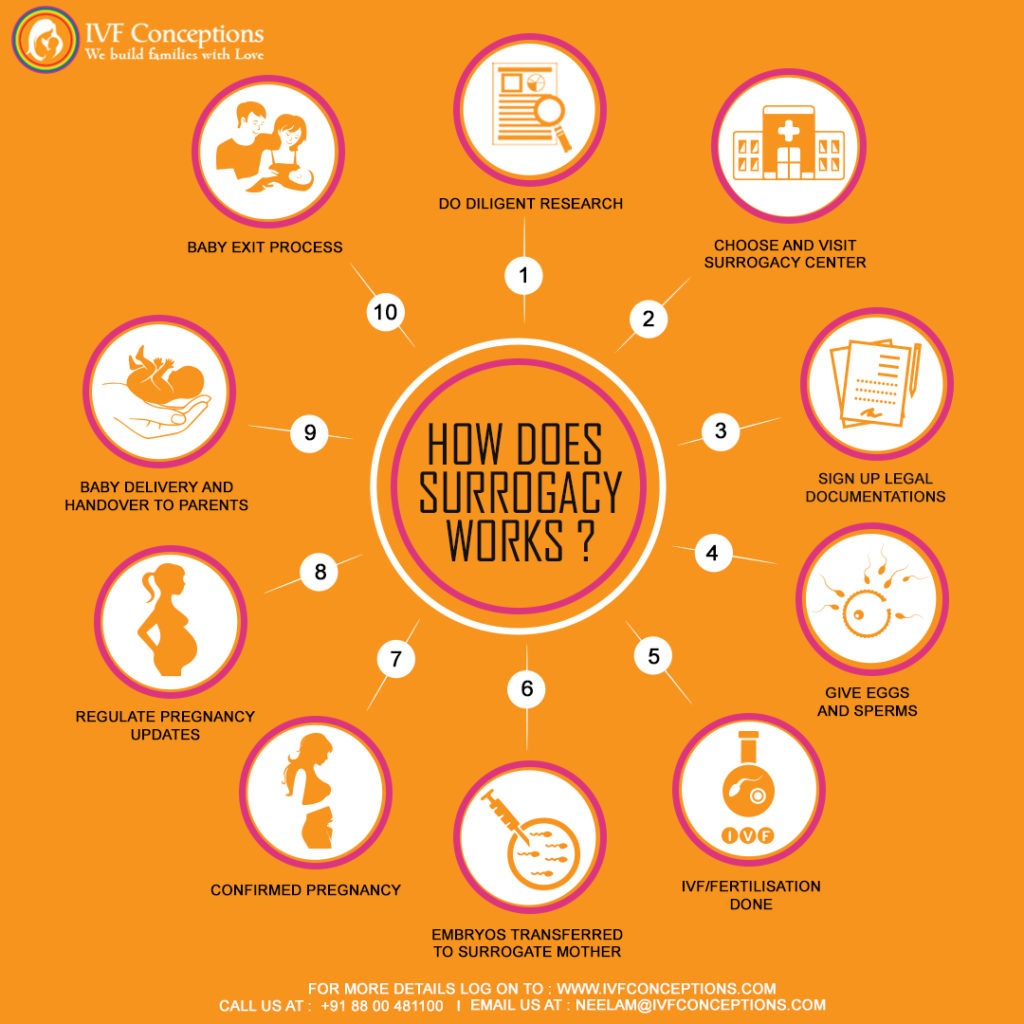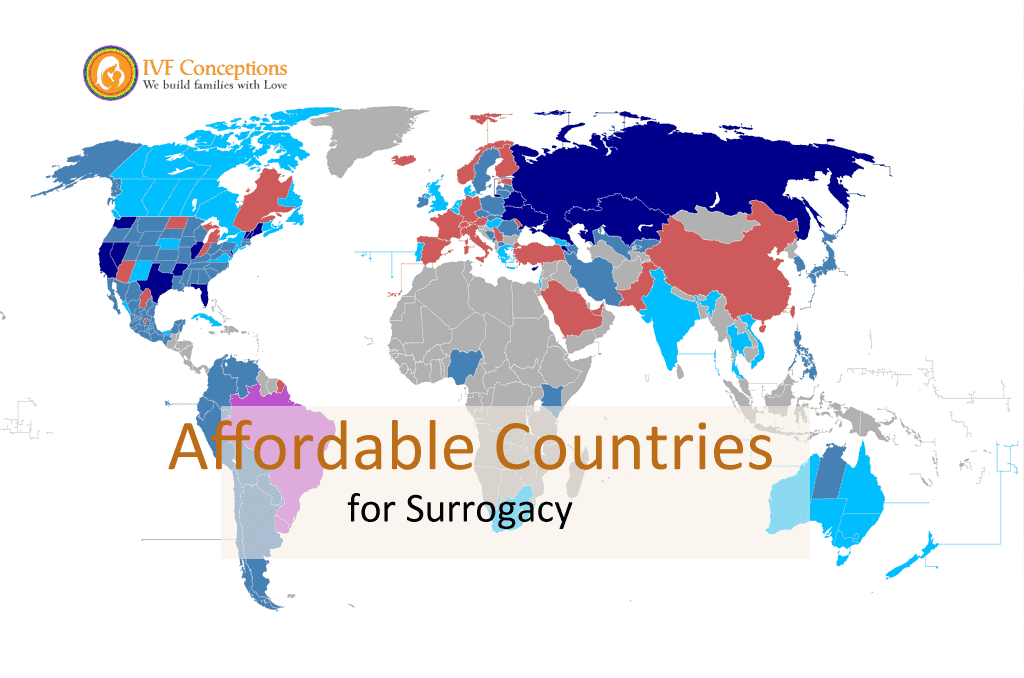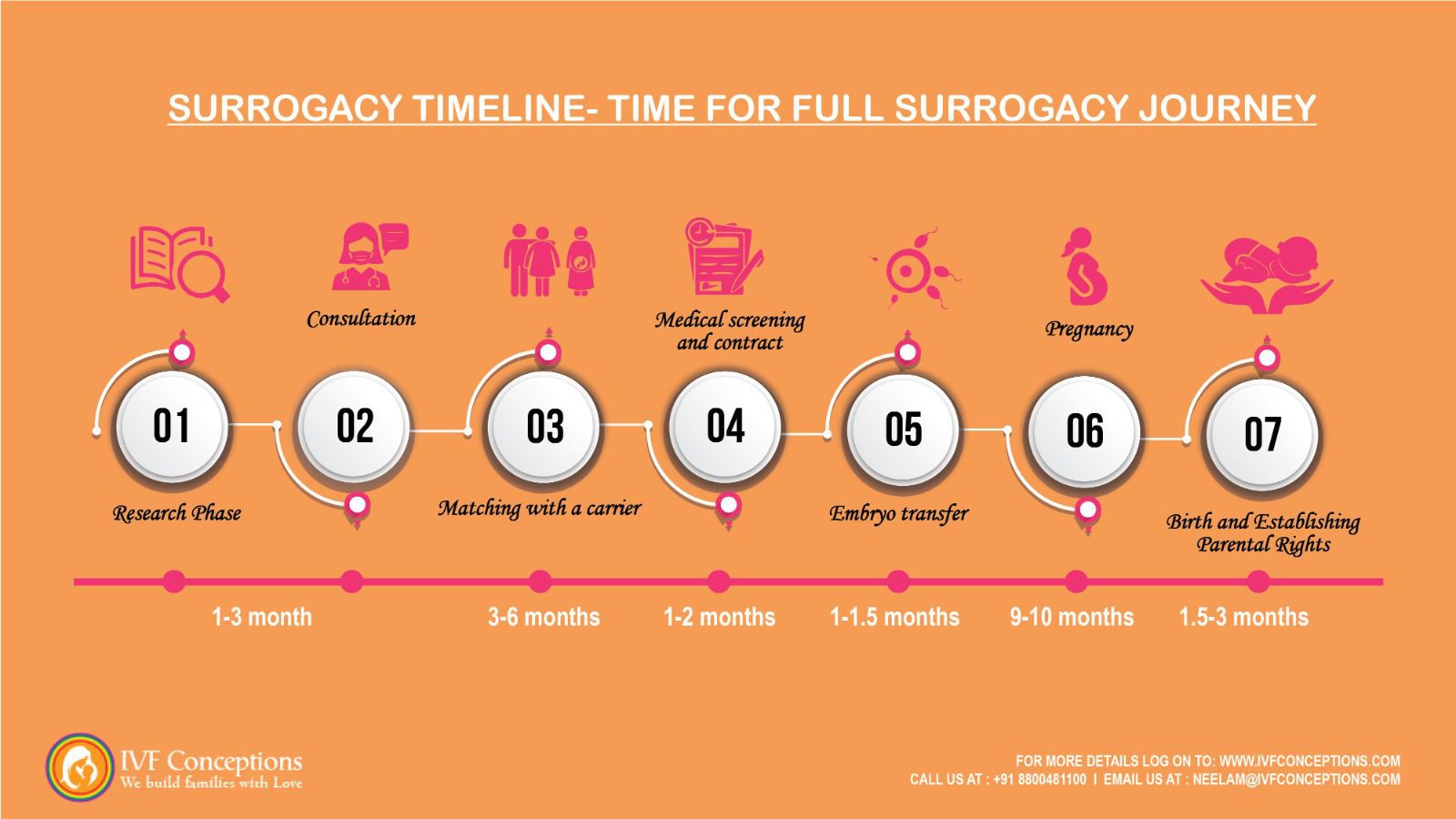How Does Surrogacy Work? Complete Surrogacy Guide Including -Types, Processes, Costs, Risks, And Legislation
Surrogacy is an assisted reproduction process where a woman (the surrogate) carries and delivers a child for another individual or couple (intended parents). This guide provides a detailed overview of surrogacy, covering types, legal aspects, costs, and a country-wise comparison to help intended parents make informed decisions.
The starting point of any surrogacy process is to know “how does surrogacy work” and if this is the right option to grow a family for you. In this guide, we will cover all the aspects of surrogacy.
The demands for gestational carriers have increased over the years. That is what CDC data shows about how surrogacy has worked over the years:
“Between 1999 and 2013, about 2% (30,927) of all assisted reproductive technology cycles used a gestational carrier to have the baby.” “The number of gestational carrier cycles increased from 727 (1.0%) in 1999 to 3,432 (2.5%) in 2013.”
Some salient features of surrogacy carrier cycles are:
- Between 1999 and 2013, surrogate mother cycles resulted in 13,380 deliveries and the birth of 18,400 infants. The information shows that 9,819 (53.4%) of these infants were twins, triplets, or higher-order multiples.
- Intended parents using a gestational carrier were older than parents who did not use a surrogate mother.
- Most surrogates were less than 35 years of age at the time of conceiving a surrogacy baby/ surrogacy babies.
- Around 16% of intended parents who used a gestational carrier were from outside the USA.
- Gestational carrier cycles had higher rates of implantation, pregnancy, and live births when compared to non-gestational carrier cycles.
- There were higher multiple births and preterm delivery rates among gestational carrier cycles—largely due to the frequent transfer of two or more embryos per cycle.
Get in touch for FREE SURROGACY CONSULTING:
Mobile: +91-8800481100 ( WhatsApp, Line, Viber)
Email: neelam@ivfconceptions.com
What is Surrogacy?
Gestational surrogacy is an arrangement in which a woman (surrogate mother) agrees to carry a baby and give birth on behalf of commissioning parents (who can be single males or females) or couples (hetero couples or same-sex couples).
Surrogacy is an unconventional method of becoming parent with the help of assisted reproduction ( like IVF) and third-party reproduction ( like egg donation and surrogacy).
A typical surrogacy process is supported by a legal contract between the parties involved – the intended parents, egg donor, surrogacy agencies, and surrogate mother. Surrogacy brings hope to infertile couples who dream of becoming parents but are unable to do so due to various medical reasons.
There are two types of surrogacy: traditional surrogacy and gestational surrogacy.
A. Traditional Surrogacy
- The surrogate is biologically related to the child.
- Conception occurs via artificial insemination (IUI) using the intended father’s or donor sperm.
- Less common due to emotional and legal complexities.
B. Gestational Surrogacy (Most Common)
- The surrogate has no genetic connection to the baby.
- The embryo is created via IVF using the intended parents’ or donor gametes.
- Legally and ethically preferred in most countries.
Who Needs Surrogate Mothers?
Surrogate mothers are needed by individuals (mostly single parents) or infertile couples who are unable to conceive a baby on their own or carry a pregnancy to term due to known or unknown infertility. Mostly, surrogacy is the last option for a couple who has undergone long and frustrating infertility treatments with no success.
Surrogacy for gay couples is the only way to have biological children. With the acceptance of all family types, surrogacy is popular among gay individuals with kids.
Ultimately, the decision to use a surrogate mother is a personal one and should be made after careful consideration and consultation with medical professionals and legal experts.
When do you need surrogacy?
You might consider a gestational carrier due to the following reasons:
- When a female partner has missing or abnormal uterus/endometrium lining issues.
- When women had multiple failed in-vitro fertilization cycles.
- The couple had multiple pregnancy losses due to unexplained reasons.
- When a woman is unable to conceive even after appropriate medical attention, like IVF cycles. Unexplained or idiopathic infertility is a condition in which couples are not able to conceive without any definite causes.
- Sometimes,a couple might have personal reasons to opt for gestational surrogacy.
- For same-sex couples, having a surrogate mother is the obvious choice.
At the personal level, first, the couples need to understand if they are emotionally prepared to have a baby via surrogacy. Will they be bonding with the child in the same way as a natural child? What information do they wish to share with the child when he/she grows enough to understand? Once these personal questions are answered and accepted, you can begin the rest of the journey.
Some guides to choosing the best surrogacy service provider:
How to choose a surrogacy agency?
How to manage surrogacy costs?
How to find a surrogate mother without a surrogacy agency?

How does surrogacy work?
How does surrogacy work – A Step-by-step guide
Gestational surrogacy comes with a huge financial and emotional enterprise.
There are many surrogacy options available on the net, but which one is best suited to your needs is important to know. You might consider your marital status, your citizenship, where you wish to do surrogacy, what type of surrogacy you need, and what your financial budget is for surrogacy.
Do not shy away from contacting a few surrogacy agencies or surrogacy clinics to explore your surrogacy possibilities. It is good to consult with an experienced surrogacy consultant who can guide and support you and help you shortlist the best program for you.
The surrogacy process takes 18 months to 24 months, depending on the individual circumstances
Surrogacy Process: Step-by-Step
- Initial Consultation & Medical Evaluation – Intended parents and surrogates undergo medical and psychological screenings.
- Legal Agreements – A surrogacy contract is signed, outlining rights, responsibilities, and financial aspects.
- IVF & Embryo Transfer – Fertility treatments create and transfer embryos to the surrogate.
- Pregnancy Monitoring – Regular check-ups ensure a healthy pregnancy.
- Birth & Parental Rights – After delivery, legal steps establish parental rights.
Outlines the surrogacy process timeline for the intended parents:
| Stage | Description of Stage | Duration |
| Research Phase | Explore family-building options and decide on surrogacy. | Personal timeframe |
| Consultation and Application | Choose a surrogacy agency, sign an agreement, and start embryo creation (if needed). | 1-3 Months |
| Matching | The agency finds and presents potential gestational carriers. Meet and decide on a match. | 3-6 Months |
| Medical Screening and Contracts | Carrier undergoes medical and psychological screening. Sign a surrogacy contract. | 1-2 Months |
| Embryo Transfer | Prepare for embryo transfer. Success may take multiple attempts. | 1-1.5 Months |
| Pregnancy | Gestational carrier’s pregnancy, approximately 40 weeks. | 9-10 Months |
| Birth and Postpartum | Baby’s birth, establish parental rights, and the postpartum period. | 1.5-3 Months |
Please keep in mind that the durations mentioned in the table are approximate and can vary depending on individual circumstances and other factors. Always consult with a reputable surrogacy agency or professional to get personalized guidance throughout the surrogacy journey.
Let’s see how the surrogacy timeline works – step-by-step process
#1. Creating and Cultivating Embryos:
The very first step of any surrogacy process is to consider doing IVF to create embryos. IVF is the most commonly used assisted reproductive technology (ART) under which eggs (taken from the female partner or from an egg donor) and sperm (which are provided by the male partner or sometimes a sperm donor) are fertilized and cultivated in a lab under artificial conditions. The full process of IVF might take 2-3 months.
During the IVF process, eggs are retrieved and fertilized with sperm, and this fertilized egg, now called an embryo, undergoes embryo culture for 2-6 days in the laboratory.
The embryos are normally transferred on day 3 or day 5 (blastocyst) to the uterus of the intended mother (surrogate mother in case of surrogacy) via a catheter to establish a successful pregnancy.
The practice of fresh embryo transfer or frozen embryo transfer is done based on your specific case. Nowadays, most embryo transfers are done after the freezing of embryos. To choose healthy embryos, most fertility clinics opt for PGD to choose the healthy embryo for transfer.
Pre-implantation genetic diagnosis (PGD) is a laboratory procedure used in conjunction with in vitro fertilization (IVF) to reduce the risk of passing on inherited conditions.
The most important step of IVF is monitoring and stimulating a female’s ovary to produce many follicles. This process takes 2 weeks and needs to be done under the supervision and guidance of a fertility expert.
The aim is to produce as many eggs as possible to have a greater number of embryos and subsequently, a greater number of embryos for transfer.
If you are using an egg donor, it is advised to choose a younger and proven donor with past donation histories with a good number and quality of eggs.
As not all mature eggs are fertilized, the number of fertilized eggs or embryos on day 1 is less than the number of eggs harvested. Similarly, the number of embryos on day 3, and day 5 gets reduced as not all embryos grow till that stage. Furthermore, if you do genetic testing like PGD or NGS, the number of genetically healthy embryos would be much less.
More resources:
IVF Process- What Parents Should Know For High IVF Success Rate.
Egg Donation Process- The Definitive Guide for IVF Egg Donor
10 Easy Tips For a Successful IVF Cycle
#2. Surrogate Matching Process
Surrogate matching is one of the most important and time-consuming processes. Agencies make sure that they offer the surrogate mother the best suited to the needs and expectations of the intended parents. It generally takes 3-6 months to match a surrogate mother. It consists of multiple application reviews, medical and psychological evaluations, and the general outlook of the surrogate before finalizing the right candidate.
As surrogate mothers are not anonymous in most countries, intended parents can meet surrogate mothers to know each other better.
The medical screening of all parties is done to ensure medical eligibility. The female partner undergoes a fertility evaluation to verify her fertility. Same way, the male partner needs to undergo a few blood tests and sperm analyses to make sure he is a good fit for IVF. The number of pre-IVF tests and scans is more extensive for a female partner.
For the gestational carrier, most tests and scans are done to make sure of her robust health and her capacity to carry a baby. Her reproductive health and her uterine lining are of utmost importance in her medical evaluation.
More resources:
Top 12 Surrogate Mother Requirements That Parents Should Know.
How much is the Surrogate Mother’s Payment?
What Is the Right Surrogate Mother Age?
Everything About Surrogate Mother Health Requirements
https://www.ivfconceptions.com/ivf-for-surrogacy/
#3. Synchronizing with the Recipient
To match the menstrual cycle of the female partner or egg donor with the recipient (surrogate mother) for IVF, you will be asked to take birth control pills. Birth control pills are used to control the menses of the egg donor, and thus, the IVF cycle becomes manageable. That is especially important if you are using a traveling egg donor.
In the case of frozen embryo transfer, no synchronization is needed. Compared to the fresh IVF cycle and transfer, it is easy to manage frozen embryo transfer.
#4. Uterus Lining Preparation
The gestational carrier needs to undergo a slightly aggressive approach for her lining preparation. She must take oral meds/injectables to help in building the desired thickness of the endometrium layer before embryo transfer.
The fertility doctor advises having a thickness of 10 mm at the time of embryo transfer. The surrogate mother needs to visit the IVF Clinic 3-4 times to review the thickness of the endometrium lining. If her lining is progressing well, the doctor gives the exact date and time for embryo transfer.
Generally, the embryo transfer is done around days 18 to 21 of surrogate’s menses. At this stage, intended parents are one step closer to their dream of having a baby. The uterus lining preparation can take 1-2 months based on the cycle status of the surrogate mother.
More resources for gestational surrogacy:
8 Easy-to-Follow Tips For Successful Surrogacy Pregnancy
Should I Have PGS Testing on My Embryos?
What are Better Fresh Eggs or Frozen Eggs?
How to Calculate Your Most Fertile Days?

#5. Embryo Transfer Day
Embryo transfer is relatively easy as compared to egg pick-up. Typically, a catheter is used to transfer the embryo to the uterus trans-vaginally, and the whole process can take up to 15 to 20 minutes.
It is a day procedure and the surrogate can go home after 1-2 hours of rest in the IVF clinic. She will be prescribed a few oral and injectable meds and needs to take bed rest for 2-3 days.
After this, she can resume her day-to-day activities but needs to avoid any strenuous tasks. She needs to come after two weeks for the BHCG Blood test to confirm pregnancy.
#6. BHCG Test to Confirm Pregnancy
The 2-week wait time is an anxious yet exciting time for the surrogate mothers and commissioning parents.
At around day 10 after embryo transfer, a home pregnancy test, known as human chorionic gonadotropin (hCG) is done to confirm the pregnancy. This is a urine test advised to do first thing in the morning. A pregnant woman’s placenta produces hCG, also called the pregnancy hormone. If the surrogate mother is pregnant, the initial urine test can usually detect this hormone in the urine about ten days after the embryo’s transfer.
Although the home pregnancy test kit is 99% accurate, your fertility doctor would like to have a blood sample drawn to check the human chorionic gonadotropin hormone. The blood test is almost 100% accurate and leaves no room for guesswork.
To confirm if the pregnancy is progressing well, the fertility doctor advises having 2-3 more BHCG tests to make sure the human chorionic gonadotropin hormone value is increasing. Ideally, the repeat tests are done after 24-48 hours. If values are doubling, that means all is well!!
It is worth mentioning that in the case of twins, there will be a higher value of BHCG in your tests. Although at the time of the BHCG, you will not know if it is twins. But due to 2 placentas, there will be a higher level of the BHCG hormone. Your fertility doctor can hint at it, but you need to wait till they see the twins’ gestational sacs in the scan.
Read more:
How to Cope with The 2-Week Wait After IVF?
When to stop trying for IVF and go for Surrogacy?
Guaranteed Surrogacy Baby Program: What All You Need to Know.
How does surrogacy work with a family member?
#7. Pregnancy and Prenatal Care
Once pregnancy is confirmed and the doctor has seen the gestational sac. They will continue with external hormonal support till the 12th week.
After that, the IVF pregnancy is like a natural pregnancy. The monthly check-ups are done as per the standard antenatal care. This phase is full of excitement and expectation for both the surrogate and the commission parent.
If the Intended parents wish, they can be present at the time of the scans. Seeing the unborn child’s pics and hearing the heartbeats is an emotional experience for the intended parents.
#8. The Baby Delivery
Typically, the baby is fully ready for delivery by weeks 38 to 40 and can arrive any time after that. During the routine visits for ultrasound scans, your doctor might give you a tentative Estimated Delivery Date (EDD). However, this date can vary and change, especially early in the pregnancy.
In any case, the birth date and mode of delivery are discussed well in advance with the surrogate mother and intended parents. In case of any unseen emergency, things may not go as planned, but doctors are well-equipped to take a decision based on the situation.
The arrival of a surrogate baby is a moment of great joy for the Intended Parents!!
Read more:
Planning Surrogacy – Know Expectations vs Reality
Why is Colostrum Important For a Surrogacy Baby?
How to Prepare For a Surrogacy Baby Birth?
What are the Risks of a Surrogate with Twins?
#9. After-Birth Legal Process
After the birth, the legal process of gaining parental rights of the baby starts. The legal framework of each state (in the US) is different, and based on the jurisdiction, the baby’s birth certificate is issued with or without the name of the Intended Parents. It is good to discuss the legal parentage process or 2nd parent adoption before starting the surrogacy process.
For commissioning parents who have a baby delivered abroad, more thorough research and planning is needed. To get the baby back to your country, the baby will need to apply for citizenship and a passport. The baby gets the citizenship of the intended parents by filling out the application at their local embassy in the surrogacy country. Some countries, like the USA, will ask for DNA tests to confirm paternity before giving citizenship by descent.
The process of getting citizenship and a passport may take a few weeks to a few months, depending on the nationality of the parents.
Related Topic on International Surrogacy:
Top 4 Cheapest Countries For Surrogacy That Parents Should Know (in 2023)
International Surrogacy Countries- What You Need to Know ( in 2023)
International Surrogacy Process- Free Consultation for Surrogacy Seekers
What Are the Risks of International Surrogacy?
International Surrogacy Countries- What You Need to Know ( in 2025)

Legal Considerations by Country
Surrogacy laws vary widely. Below is a comparison of popular surrogacy destinations:
| Country | Legal Status | Eligibility | Estimated Cost | Guaranteed Programs Available? |
|---|---|---|---|---|
| USA | Legal in many states | Heterosexual & LGBTQ+ couples, singles | $100,000 – $150,000 | Yes |
| Georgia | Legal (only for married heterosexual couples) | Married heterosexual couples | $45,000 – $60,000 | Yes |
| Mexico | Legal in some states | Heterosexual & LGBTQ+ couples, singles | $65,000 – $75,000 | Yes |
| Colombia | Legal | Heterosexual & LGBTQ+ couples, singles | $60,000 – $70,000 | Yes |
| Ukraine | Legal (only for married heterosexual couples) | Married heterosexual couples | $50,000 – $65,000 | Yes |
📌 Tip: Always consult a surrogacy lawyer to understand the legal framework before choosing a destination.
Choosing the Right Surrogacy Destination
Key Factors to Consider:
✅ Legal Framework – Are parental rights protected? Is surrogacy allowed for international parents?
✅ Affordability – What is the total cost? Are there hidden fees?
✅ Success Rates & Medical Facilities – Are fertility clinics well-equipped?
✅ Surrogate Availability – Are experienced surrogates accessible?
Information on international surrogacy laws:
| Country | Eligibility for Surrogacy | Types of Surrogacy Allowed | Legal Protection for Intended Parents | Accessibility for Foreigners | Advertising for Surrogates |
| Australia | Altruistic surrogacy only | No donor or surrogate matching | Not applicable | Not applicable | Not Legal |
| Canada | Altruistic surrogacy only | Not applicable | Not applicable | Altruistic surrogacy allowed | Not applicable |
| Greece | Heterosexual couples, single females | Not applicable | Not applicable | Foreign nationals allowed | Not applicable |
| Georgia | Heterosexual couples (including foreigners) | Compensated surrogacy | Well protected | Foreigners allowed | Not applicable |
| Ukraine | Heterosexual couples (including foreigners) | Compensated surrogacy | Well protected | Foreigners allowed | Not applicable |
| India | Indian citizens only | Commercial surrogacy allowed | Not applicable | Not applicable | Not applicable |
| Israel | Heterosexual Israeli citizens | Altruistic surrogacy only | Not applicable | Not applicable | Not applicable |
| Kenya | Locals and foreigners | Compensated surrogacy | Not legally protected | Not applicable | Not applicable |
| Laos | Foreigners only | Compensated surrogacy | Not legally protected | Foreigners allowed | Not applicable |
| Nigeria | Heterosexual Nigerian citizens | Altruistic and commercial surrogacy | Not applicable | Not applicable | Not applicable |
| South Africa | Heterosexual South African residents | Altruistic surrogacy | Not applicable | Not applicable | Not applicable |
| Thailand | Heterosexual Thai couples | Altruistic surrogacy only | Not applicable | Not applicable | Not applicable |
| UK | Not applicable | Altruistic surrogacy only | Not applicable | Foreigners cannot access | Not legal |
| USA | Gay and heterosexual foreigners | All forms of surrogacy | Well regulated | Foreigners allowed | Not applicable |
How to Find a Surrogate Mother?
Finding a surrogate mother is the most important part of any surrogacy process. It takes time and patience to find the ideal candidate. Both intended parents and surrogate mothers need to be sufficiently comfortable and at ease with each other.
The mutual respect and admiration needed from the intended parents, and a kind and helpful attitude are needed from the surrogate side. You might like to have a few of the surrogate profiles before finding the perfect match.
You can use the options below to find a surrogate mother for you:
- Through surrogacy agencies: You might consider help from professional surrogacy agencies locally. Or else, you might like to work with international surrogacy countries, which offer cost-effective options.
- Online surrogate mother directories: There are a few surrogate-matching online platforms. The data consists of a list of surrogate mothers and intended parents. Some of these online portals require be paid subscription to get the contact details, for example.
- Find a surrogate mother within the family and friends. In this case, you can reach out to family members or close friends, who might help you.
- Surrogacy facilitators: These surrogacy professionals are experienced and helpful guides for surrogate mothers. They have years of experience and networking in the surrogacy domain. It makes it easy for them to guide and support you on this journey.
How to Select a Surrogate Mother?
If you are considering using a surrogate mother to expand your family, selecting the right person is the most critical step in the process.
So, here are a few parameters to consider while selecting a surrogate mother.
- Age Limit – According to the American Society of Reproductive Medicine,e you have to be between 21 to 45 years of age.
- No smoking and drinking habits
- Should have a BMI of less than 30
- Should have no major complications from previous pregnancies
- Should not have a history of postpartum depression
- Have at least one successful pregnancy before and have no more than five vaginal births and three deliveries of a cesarean.
- Be free of treatable STDs for at least 12 months before.
- Discontinue the use of antidepressants or anti-anxiety medicines at least 12 months before the surrogacy
- Be able to travel as needed for appointments
- Wait at least 12 months from the last tattoo or piercing before starting the surrogacy.
- The surrogate mother has undergone thorough counseling and has had a psychological evaluation and medical testing.
- Consider the personality compatibility of the surrogate mother. While it is important to select a surrogate mother who meets certain medical and legal requirements, personal compatibility is also important. Make sure you feel comfortable and able to communicate effectively with your surrogate mother, as this can help ensure a smooth and positive experience for everyone involved.
- Although a monetary benefit is a great way to appreciate surrogate services, it should not be the only reason to become a surrogate mother.
More Resources:
What is the surrogacy cost of using a family member?
How does surrogacy work with insurance coverage?
How does surrogacy work for a single parent?
All about surrogacy for gay couples
What are the Pros and Cons of surrogacy?
PROS
Creates Relationships – Surrogacy creates relationships and caters to those relationships with love and nurture. It is a selfless act of kindness and compassion.
Completes Family – Gestational surrogacy completes families for infertile couples. Surrogacy gives an opportunity to these families to have a genetically connected baby of their own.
Getting involved at each step – Intended parents can be part of IVF and embryo transfer. It is common for would-be parents to accompany surrogates for their ultrasound scan and have first-hand experience via scan pics and heartbeats.
Surrogacy gives assurance of a baby. With advanced ART techniques, the success rate of IVF has improved, and thus the higher success rate of surrogacy pregnancy. Also, according to SART, 75% of the surrogates conceive a child to succeed in the USA.
CONS
Surrogacy is a complicated process. A surrogacy journey can be complex, emotional, and tough, but with determination and perseverance, the guidance of surrogacy professionals, and the support of loved ones, it is possible to have successful surrogacy parenthood.
Surrogacy cost is higher – Gestational surrogacy cost is higher than what most of the intended parents can afford. The higher surrogacy fee is due to costly medical processes like IVF, egg donor, surrogate compensation, surrogacy agency fees, and not to forget legal fees, etc.
Surrogacy is a time-consuming process. A typical surrogacy process takes 1.5 to 2 years. Surrogacy need is a game of commitment and patience, as the long duration of IVF cycles and subsequent failed embryo transfer can be hard.
Surrogacy is emotionally demanding – Surrogacy is an emotionally demanding journey both for the intended parents and the surrogate mother.
What are Typical Complications in the Surrogacy Process?
Complications can arise during gestational surrogacy.
Medical Complications: Like any natural pregnancy, there is always a risk of medical complications. The surrogate mother may experience complications such as gestational diabetes, hypertension, and preeclampsia. It is important to note that surrogacy is a medical process that involves careful monitoring by medical professionals throughout the pregnancy.
Legal complication: Apart from the medical risks associated with pregnancy, there can also be legal complications. In some cases, the intended parents may have difficulty establishing legal parenthood, particularly if the surrogate mother changes her mind and decides to keep the baby. In such cases, legal battles can arise, and it can be emotionally distressing for all parties involved.
Prior to the embryo transfer, the surrogate mother and the intended parents need to work with the attorney to negotiate and draft the contract of surrogacy. There are basically two major requirements of such surrogacy agreements. Social responsibility is to make sure the social responsibilities of the intended parents to take care of the surrogate mother. The second most important part of the surrogacy agreement is the financial agreement.
Financial burden: In addition, the cost of surrogacy can also be a complication. Surrogacy expenses may not be covered by insurance. Intended parents may need to pay for medical expenses, the surrogate’s compensation, and legal fees, among other expenses. This financial burden can be a significant challenge for some intended parents.
More topics on the legal aspect of surrogacy:
Best international surrogacy countries
All about the legal process of surrogacy
The risk associated with pregnancy and birth
What Is the Legal Process of Surrogacy?
Why Parents Should Establish a Legal Guardian For a Surrogate Baby?
What Are the International Surrogacy Laws By Country?
Table with information on countries and their surrogacy laws:
| Country | Commercial Surrogacy | Altruistic Surrogacy | Surrogacy Status |
| Australia | Prohibited | Allowed | Altruistic surrogacy is legal in all jurisdictions. Commercial surrogacy is a criminal offense. |
| Canada | Banned | Allowed | Only altruistic surrogacy is permitted. Compensation for gestational carriers is limited to approved expenses. |
| Colombia | Uncertain | Allowed | There are no clear rules, but altruistic surrogacy is performed and well tolerated. |
| Greece | Banned | Allowed | Heterosexual couples, single females allowed. |
| India | Prohibited | Allowed | Altruistic surrogacy is permitted for certain couples based on medical and age criteria. |
| Israel | Allowed | Allowed | Gestational surrogacy is legal under the Embryo Carrying Agreements Law. |
| Kenya | N/A | N/A | No legal regulations/laws for surrogacy in Kenya. |
| Mexico | Allowed | N/A | Surrogacy, along with ovum and sperm donation, has been legal since 1992. |
| New Zealand | N/A | Allowed | Altruistic surrogacy is legal. |
| Thailand | Banned | N/A | Commercial surrogacy is criminalized under the Medical Council Act. |
| Ukraine | Allowed | Allowed | Surrogacy and egg/sperm donation are legal and supported by liberal laws. |
| United Kingdom | N/A | Allowed | Surrogacy laws vary across different states/territories in the UK. |
| United States | Varies by state | Allowed | Surrogacy laws vary by state, some are surrogacy-friendly, while others restrict or penalize commercial surrogacy. |
Additional guides for surrogacy countries :
https://www.ivfconceptions.com/find-best-surrogacy-agency-in-mexico/
https://www.ivfconceptions.com/budget-surrogacy-options-in-eastern-europe/
https://www.ivfconceptions.com/which-european-countries-allow-surrogacy/
https://www.ivfconceptions.com/surrogacy-in-germany/
https://www.ivfconceptions.com/surrogacy-in-ghana/
Australia
Altruistic surrogacy is legally allowed under Australian law, but commercial surrogacy is prohibited in New South Wales, Tasmania, Queensland, and the Australian Capital Territory. This means the surrogate cannot be paid for carrying a baby up front. That is why many intended parents from Australia do surrogacy overseas in countries like the US, Mexico, Australia, Ukraine, and Georgia. , and other countries that are pursued by many infertile Australian couples.
Canada
The Assisted Human Reproduction Act prohibits a woman from providing or accepting consideration for acting as a surrogate; paying for her services to a surrogate mother is illegal. However, it is legal to reimburse a surrogate mother as a result of the surrogacy for her reasonable expenses incurred. Learn more about surrogacy in Canada.
Cyprus
For surrogacy in Cyprus, there is no law regulating surrogacy, so clinics and surrogacy agencies offer programs to all couples. The surrogate’s contract with the intended parents is not legally binding, and the surrogate retains the right to request parental rights over the baby.
Within 3 months after the baby is born, the surrogate can choose to give up her parental rights. The intended parents then have to complete an adoption process in order to claim parental rights.
Cyprus is traditionally conservative, but it has adopted some laws supporting LGBT people. For example, gay marriage and adoption are not possible in Cyprus, but civil unions have been available since 2015.
Greece
Since 2002, altruistic surrogacy in Greece has been permitted for Greek citizens. Twelve years later, however, the law was extended, particularly in July 2014, granting foreign citizens the right to become parents through surrogacy in Greece as well.
Same-sex couples and single men cannot participate in the surrogacy process. Currently, only opposite-sex couples and single women can legally do surrogacy in Greece. They may be either married or unmarried in the case of heterosexual couples. The intended mother’s age cannot exceed 50 years, and she must seek medical evidence of her failure to have children in her home country through a letter from a doctor.
Colombia
Although in Colombia, there are no laws unique to surrogacy, there are no prohibitions on surrogacy. Colombia’s surrogacy is open to all, providing a special choice to homosexuals, singles, and couples searching for a more economical option.
Colombia is the newest and most promising surrogacy destination, which is emerging in Latin America. It has all the qualities that can make it an ideal surrogacy option for affordable gay surrogacy.
The positive aspects of surrogacy in Colombia are-
- As per the constitution of Colombia, there should be no discrimination against the LGBT community. Thus, same-sex couples, or gay couples, are as eligible as heterosexual couples to start their family via surrogacy agreements.
- The Constitutional Court of Colombia legalized LGBT marriage in 2016. That means same-sex couples have the same family-building rights as heterosexual couples or singles.
- In 2015, LGBT couples were legalized for gay adoption. Thus, babies born via surrogacy can be quickly adopted by gay men.
- Instead of a straight ban on surrogacy like many other countries, the Colombian Constitutional Court acknowledged surrogacy as constitutional and issued guidelines for its correct implementation. This ruling has now become the de facto law in Colombia.
- Thus, we can say that gay surrogacy in Colombia is a safe and affordable option for LGBT couples. The surrogacy cost in Colombia is around $65,000 for guaranteed surrogacy babies, which is more than 70% less than the standard surrogacy fee in the USA.
Read more about surrogacy in Colombia:
Surrogacy in Colombia- Everything You Need to Know
What is the Surrogacy Cost in Colombia?
Secure Yet Cheapest Country For Gay Surrogacy- Colombia
Guaranteed Surrogacy Baby Program: What All You Need to Know.
IVF Conceptions Surrogacy Prices & Plans ( in 2025)
South Africa
Surrogate motherhood is officially governed in South Africa since Chapter 19 of the Children’s Act was promulgated on April 1, 2010. Previously, altruistic surrogacy arrangements were subject to artificial insemination legislation, contract law, and regulations, with the status of the born child as a result of such an arrangement determined by the now-repealed Children’s Status Act.
The act includes specific requirements relating to the nature of motherhood arrangements with surrogates. These agreements need to be confirmed by the High Court in writing. Unless confirmed by the High Court, a written agreement between a surrogate mother and intended parents will be invalid.
Russia
Surrogacy in Russia has been banned for foreigners since 2021, however, local Russian couples can do it.
USA
The best IVF clinics in the world are found in the US. In the United States, altruistic and commercial surrogacy is permitted. Even homosexual and single parents can go through the surrogacy process. However, surrogacy is not allowed in all 50 states of the US. Read more about i,t surrogacy in the USA
Ukraine
In current times, Ukraine offers a secure and legal surrogacy destination in the heart of Europe. However, gestational surrogacy in Ukraine is only available to married heterosexual couples. That means, no gay men or single parents are allowed to do surrogacy agreements in Ukraine. Due to the war, most of the surrogacy agencies in Ukraine have shifted to nearby countries like Georgia.
Commercial Surrogacy has been legal since 2000 for married heterosexual couples. The surrogacy legislation is the same for local residents and for international surrogacy seekers. Learn more about how much surrogacy costs in Ukraine.
Georgia
Surrogacy in Georgia is legal yet affordable, but only available to married heterosexual couples. Since 1997, the Republic of Georgia has offered secure yet affordable surrogacy and egg services.
Article 143 of Georgia legislation offers IVF and surrogacy services, and Article 144 of Georgia legislation speaks about the possibility of using an egg donor or sperm donor. Learn more about surrogacy in Georgia.
Therefore, there are different laws, rules, and regulations governing the process of surrogacy throughout the world.
The most important thing is to get in touch with an experienced and credible surrogacy consultant to get a free consultation. We at IVF Conception offer free services and secure international surrogacy programs along with our network of surrogacy agencies, egg donor agencies, and IVF clinics.
Read more about surrogacy in Georgia:
Surrogacy In Georgia (Europe)-Everything Intended Parents Need To Know
Why USA Couples Should Do Surrogacy In Georgia, Europe?
Why Georgia is the Cheapest Country for Surrogacy?
What is a surrogate mother in Georgia?
Surrogacy in Albania-What You Need to Know
Mexico
Gay Surrogacy in Mexico is possible and, as of now, is one of the most popular destinations for all family types. With a new Supreme Court decision in 2021, surrogacy in Mexico is now one of the best options globally for singles and couples of all sexual orientations seeking to have a family through an affordable and legal surrogacy arrangement.
In June 2021, the Supreme Court of Mexico ruled just that: that discrimination against foreigners and different family types was indeed unconstitutional. This ruling from the highest court in the land forms the basis for legal surrogacy in Mexico.
Our legal team will assist in the drafting of the surrogacy agreement with your surrogate mother and with the acquisition of the birth certificate at the end of the process. Additionally, they will assist you in acquiring any documents necessary to apply to your embassy for citizenship. It is important to remember that they are experts in Mexican law; they cannot advise on specific laws related to your country of citizenship, and you may need legal representation as well in your home country.
Secure or Guaranteed baby plan (for single males) is available for 66,900 USD.
Fixed-price programs with unlimited clinic & admin services until you are home with your baby. We are proud to offer the most affordable, secure, and reliable surrogacy programs in Mexico City, with the team having more than 13 years of experience in global surrogacy services.
Why choose Mexico for Gestational surrogacy for gay couples?
- Low cost as compared to the USA. You can save up to 70% of typical surrogacy costs in the USA with our assured or guaranteed baby plan. We can say it is an affordable version of US surrogacy, just 3 3-hour flight from LAX.
- Assured plan program for $67,000, which is affordable yet legally secure.
- Good Medical facility and success rates.
- Legally viable for same-sex couples. ALL intended parents, singles, married hetero couples, gay couples, or live-in partners are allowed, the only thing is that at least one IP should have a genetic link with the baby.
- Huge egg donor database of the most beautiful girls and no waiting list for dedicated surrogate mothers.
- Top-class legal team: Legality is one of the important aspects of international surrogacy. We boast of a well-renowned and experienced legal team on our side to make your baby’s exit process easy and smooth.
Read more about surrogacy in Mexico:
Surrogacy In Mexico: Intended Parents Need To Know
What is the Surrogacy cost in Mexico?
All About Gay Surrogacy in Mexico
Legal Surrogacy for Gay Couples
Gay Surrogacy Cost Explained With Breakdowns
https://www.ivfconceptions.com/cost-of-gay-surrogacy-in-canada/
https://www.ivfconceptions.com/best-countries-for-international-surrogacy/
United Kingdom
International surrogacy is not very popular in the UK, but it is allowed to do altruistic surrogacy in the UK for gay couples. Gay surrogacy in the UK is slightly lower due to the altruistic nature of the arrangements.
Gestational surrogacy agreements are not legally enforceable in the UK. It means, despite the written consent given by a surrogate mother, she cannot be forced to hand over the surrogate baby to the intended parents. That means, if she likes, she can keep the baby and can be a legal mother of the baby, even if she is not genetically linked.
A parental order is needed for all UK surrogacy seekers. A parental order is an adapted legal solution for surrogacy parents in the UK. It is done before the baby’s birth to make sure the full baby is right from the surrogate mother and her husband (if applicable) to the intended parents.
It is advised to use a single surrogate mother for a UK gay couple seeking surrogacy to reduce the complications and documentation in the parental order.
Recently, UK Laws have accepted and recognized single parents and gay couples to apply for a parental order for a surrogacy baby. Earlier, only hetero couples were allowed to do so, and single parents used to adopt the surrogacy baby. That means gay couple surrogacy in the UK is possible.
More Resources:
How much does surrogacy cost if you have a surrogate?
How to find a surrogate mother?
How does surrogacy work with insurance?
Comparison of Surrogacy Costs by Country
A comparison table will make it easier for readers to evaluate their options. Here’s a structured format:
| Country | Legal Status | Eligibility | Estimated Cost | Availability of Guaranteed Programs | Timeframe |
|---|---|---|---|---|---|
| USA | Legal in many states | Heterosexual & LGBTQ+ couples, singles | $100,000 – $150,000 | Yes, in some clinics | 12-18 months |
| Georgia | Legal (only for married heterosexual couples) | Married heterosexual couples | $45,000 – $60,000 | Yes | 12-15 months |
| Mexico | Legal in select states | Heterosexual & LGBTQ+ couples, singles | $65,000 – $75,000 | Yes | 12-16 months |
| Colombia | Legal | Heterosexual & LGBTQ+ couples, singles | $60,000 – $70,000 | Yes | 12-14 months |
| Ukraine | Legal (only for married heterosexual couples) | Married heterosexual couples | $50,000 – $65,000 | Yes | 12-16 months |
IVF Conceptions has been assisting prospective intended parents in finding a surrogate mother since 2010. So, we can safely say we are one of the most experienced and compassionate sources of information. We have already done hundreds of successful surrogacy programs and are still doing many!!
📞 Get in Touch for a Free Surrogacy Consultation
📱 +91-8800481100 (WhatsApp | LINE | Viber)
📧 neelam@ivfconceptions.com
🌐 www.ivfconceptions.com
💫 Why Intended Parents Choose Complete Surrogacy for a Safe, Smooth & Successful Surrogacy Journey:
- 🌍 Access to multiple surrogacy destinations with 15+ years of international experience
- 🏥 Partnerships with top-tier fertility clinics and agencies, backed by references from past clients
- 👩🦱 Diverse egg donor options: Asian, Caucasian, African, Oriental, and more
- 💸 Transparent and affordable pricing—direct payments with no extra agency fees
- 🔒 No hidden costs—all charges are agreed upon upfront
- 🤝 Dedicated case manager for personalized support
- 📲 Fast, honest, and clear communication throughout
- 📑 Full legal support for visas, documentation, and baby exit processes
- 🧬 Complete access to the medical records of donors and surrogate mothers
- 🚚 Assistance with frozen sperm/embryo shipment logistics
- ❤️ A compassionate team with deep experience in managing complex surrogacy programs worldwide
FAQs: How Does Surrogacy Work?
How does surrogacy work?
Typical gestational surrogacy works in 5 simple steps. It is not as easy as it seems, but the guidance and support of an experienced surrogacy agent can help immensely.
- Surrogate Matching and Screening
- IVF process to create embryos
- Embryos transfer
- Surrogacy pregnancy
- Baby delivery and legal parentage
How long does the surrogacy process take?
Generally, a start-to-end surrogacy process takes the 12th to the 18th months. The time range varies depending upon the surrogate search, if a successful pregnancy is achieved in the first attempt, and how complex is the legal situation in your country. Learn more about the Surrogacy Process
What are the different types of surrogacy?
There are mainly 2 types of surrogacy based on conception.
Surrogacy types based on Financial gain for surrogates
There are other types of surrogacy classification. Read more.
https://www.ivfconceptions.com/surrogacy-with-2-surrogate-mothers/
What are the Pros and Cons of surrogacy?
The biggest benefit of surrogacy is to have their own biologically related child for gay couples/single males/women without wombs/ infertile couples. The biggest cons of surrogacy are the high cost and legal complexity surrounding it. Read more about surrogacy’s pros and cons here.
Which are the best countries for surrogacy?
Besides the USA, gestational surrogacy is both legal and affordable for married couples in Eastern European countries like Georgia and Ukraine. Both of these countries are the best surrogacy countries for heterosexual married couples.
For same-sex couples/single males, options like Colombia and Mexico are the most affordable, reliable, and secure,e with guaranteed baby plans for @67,000.
Learn more about the
Cheapest countries for surrogacy in the world
https://www.ivfconceptions.com/single-men-surrogacy-legal-countries/
Does a surrogate baby have the mother’s DNA?
No, the surrogate baby is not genetically related to the surrogate mother. In gestational surrogacy, the surrogate mother is not genetically related to the baby because she does not provide the egg used for fertilization. Instead, the embryo is created using either the intended mother’s egg or a donor egg, which is then fertilized with the intended father’s sperm. However, in traditional surrogacy, the surrogate mother’s egg is used for fertilization, which means that the child would have half of the surrogate’s DNA. This can complicate the legal and ethical situation surrounding surrogacy, as the surrogate mother may have a stronger claim to the child.
What is surrogacy, and how does it work?
Surrogacy is a process where a surrogate mother carries and gives birth to a baby for intended parents. It involves IVF (in vitro fertilization), where an embryo is created using the intended parents’ or donor’s sperm and egg and transferred into the surrogate’s uterus.
What are the steps involved in the surrogacy process?
The surrogacy process step by step includes:
- Choosing a surrogacy agency or clinic
- Matching with a surrogate
- Signing a surrogacy contract
- Medical and psychological screening
- IVF and embryo transfer
- Pregnancy monitoring
- Legal procedures and birth
- Intended parents gain legal custody
Is surrogacy legal in my country?
Surrogacy laws vary by country and state. Some countries like Georgia, Ukraine, and select U.S. states have well-regulated surrogacy laws, while others like France, Germany, and China prohibit it. Always check surrogacy rules and regulations before starting the process.
How much does surrogacy cost?
Surrogacy costs depend on location, medical needs, and legal expenses. On average:
- USA: $100,000 – $150,000
- Ukraine & Georgia: $40,000 – $70,000
- Mexico & Colombia: $50,000 – $90,000
The cost covers IVF procedures, surrogate compensation, medical expenses, legal fees, and agency services.
Who can opt for surrogacy?
Surrogacy is an option for:
- Couples with fertility issues
- Same-sex couples (LGBTQ+ parents)
- Single intended parents
- Women with medical conditions preventing pregnancy
What legal steps are required for surrogacy?
The legal process of surrogacy includes:
- Signing a surrogacy contract outlining rights and responsibilities
- Establishing parental rights through pre-birth or post-birth court orders
- Ensuring the surrogate has no legal claim over the baby
What medical procedures are involved in surrogacy?
Surrogacy requires IVF and embryo transfer. Steps include:
- Ovarian stimulation & egg retrieval (for intended mother or donor)
- Sperm collection & fertilization
- Embryo implantation in the surrogate’s womb
- Prenatal care and monitoring
What are the ethical concerns in surrogacy?
Common ethical concerns in surrogacy include:
- Surrogate exploitation in countries with poor regulations
- The emotional impact on the surrogate and child
- Parental rights and legal disputes
What’s the difference between altruistic and compensated surrogacy?
- Altruistic Surrogacy: The surrogate receives no financial compensation beyond medical expenses.
- Compensated Surrogacy: The surrogate receives monetary compensation for carrying the child.
How can I find a reliable surrogacy agency or clinic?
Look for an agency with:
- A strong track record and success stories
- Transparent pricing
- Legal and emotional support
- Medical partnerships with top fertility clinics
Reference used:
- https://www.usa.gov/laws-and-regulations
- https://www.justice.gov/reproductive-rights
- https://www.hcch.net/en/home
- https://www.who.int/health-topics/infertility
- https://www.eshre.eu (European Society of Human Reproduction and Embryology – ESHRE)
- https://en.wikipedia.org/wiki/Surrogacy (Wikipedia – General overview and country-specific laws)






